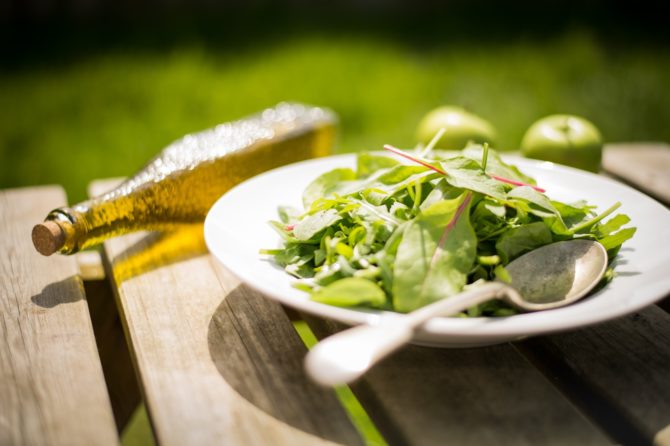
Why Eating the Right Foods Can Help You Maintain Sobriety
When it comes to nutrition, many people believe that a well-balanced diet is essential in order to maintain a healthy weight, and supply the body with the nutrients it needs to perform at its best. But research shows that a healthy diet full of fresh fruits, vegetables, legumes, and whole grains, can actually improve mental health, as well as physical health. People living with alcoholism, and mental health disorders like depression and anxiety, can greatly benefit from a healthy diet, especially during recovery.
However, the standard American diet tends to rely heavily on unhealthy foods—refined sugars, processed meats, and fried foods that lack any nutritional value. It’s true that packaged foods and canned goods have a longer shelf life, are less expensive, and are quicker to prepare than fresh alternatives. But for people suffering from conditions like depression or alcoholism, eating these types of foods can cause harm inside the body, making it more difficult to recover from certain illnesses.
Why Some Foods Can Increase the Chance of Alcoholism Relapse
According to a study from the Centers for Disease Control and Prevention, only one in 10 adults meet the daily recommended servings of fruit and vegetable intake—at least one-and-a-half cups per day of fruit, and two cups per day of vegetables. When the body is starved of the nutrients it needs, it can wreak havoc on the body, leading to digestion problems, underdeveloped bones, and even more serious diseases, like dementia.
For people with alcoholism, eating a diet full of processed, unhealthy foods can derail their recovery efforts. When people drink alcohol in excess, it weakens the heart muscles, increases blood pressure, and causes inflammation in the liver and other organs. The body breaks down, and key systems can fail. When the brain lacks essential nutrients, people are more likely to feel symptoms of depression, and a lack of energy. In people with alcoholism, those negative feelings make it more difficult to control their alcohol consumption, and it can even lead to a relapse in people that are in recovery.
How Healthy Foods Can Improve Energy and Reduce Alcohol Cravings
A 2016 study published in the American Journal of Public Health determined that people who increased the number of fruits and vegetables that they ate reported feeling happier and more satisfied with their life, compared with those whose diets remained the same. Raw fruits and vegetables are high in vitamin C, vitamin B, and vitamin B-12, which have been shown to increase serotonin in the brain, and help regulate moods.
For many years, nutritional psychiatrists have studied the effects that certain foods have on the body and the brain. For example, most people have heard that a diet rich in calcium can strengthen bones, and reduce the risk of fractures. Omega 3 fatty acids found naturally in fish, nuts, and certain oils, are proven to lower the risk of chronic illnesses, like heart disease, Alzheimer’s, and arthritis.
The most common vitamin deficiencies for alcoholics are vitamin B6, vitamin B1 (thiamine), and folic acid. For people struggling with depression and alcoholism, eating these foods can aid in recovery, and help restore mental and physical health:
- Oatmeal
Drinking alcohol increases blood sugar levels, given that alcohol gets converted into sugar once it enters the body. As a result, many recovering alcoholics develop strong sugar cravings when they stop using alcohol. Oatmeal is a great low-sugar food that can replace sugary breakfast cereals or pastries. Oatmeal naturally balances blood sugar and is loaded with important vitamins and minerals. Just one-half cup of oatmeal provides 20% of the recommended daily serving of zinc, and 34% of the recommended daily serving of magnesium, both powerful vitamins that are shown to reduce feelings of depression and increase energy levels.
- Leafy Greens
For recovering addicts, a diet rich in leafy greens, like spinach, kale, chard, and parsley, can increase glutamine levels in the body. Glutamine is an amino acid packed with antioxidant benefits and is shown to reduce sugar cravings, improve digestion, improve mood, and support neurological functions. Leafy greens are also full of vitamin B6, folic acid, and beta-carotene, which are nutrients that are often found to be deficient in people who overuse alcohol. Just one cup of kale contains 684% of the recommended daily value for vitamin K, 206% of the recommended daily value for vitamin A, and 134% of the daily recommended value for vitamin C. As a rule of thumb, the darker the green, the most nutrients it contains.
- Healthy Fats
Research has shown that low levels of omega 3 fatty acids can increase the likelihood of developing depression. For recovering alcoholics, getting enough healthy fats is essential in order to detox effectively and maintain sobriety. Additionally, healthy fats are important in order to help the body absorb fat-soluble vitamins A, D, E, and K. In fact, one study concluded that a healthy amount of omega 3s in the body can actually reduce the risk of dementia in heavy drinkers. Foods that are dense in omega 3s and other essential fatty acids are fish, seeds, nuts, and beans. Some foods, like meat and eggs, are often fortified with omega 3s, to help people meet the daily recommended serving.
Final Thoughts
Recovering from alcohol addiction is a lifelong journey, but maintaining a healthy diet throughout the recovery process can improve long-term success, and reduce the risk of relapse. There are many resources available to recovering alcoholics that can help them create a diet that will improve their physical health and mental health.
As part of Windward Way’s alcoholism recovery program, our counselors work with patients to safely detox and create a personalized plan to help them maintain sobriety over the long term. If you or someone you know is struggling with alcoholism, contact us to learn about our treatment program.
Leave a reply